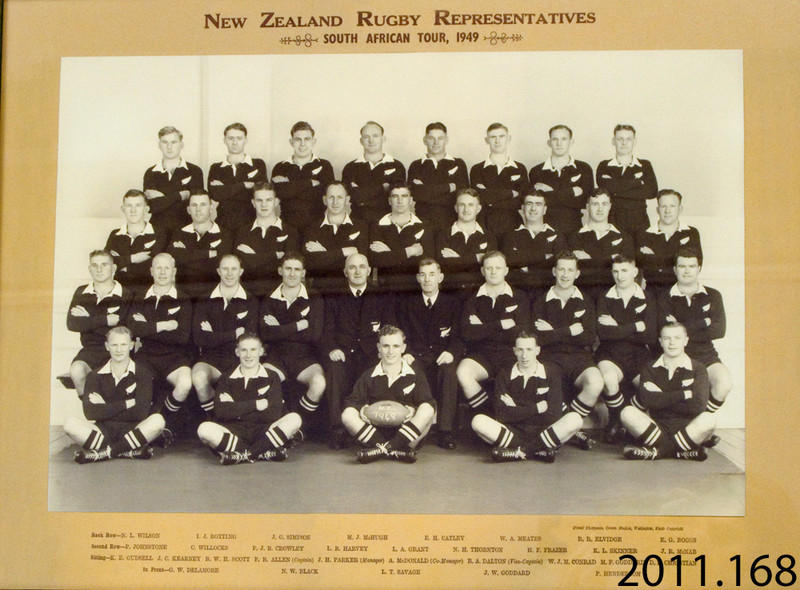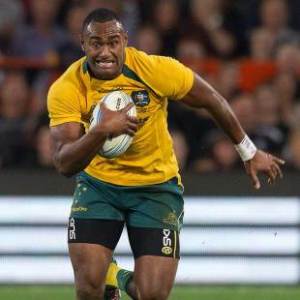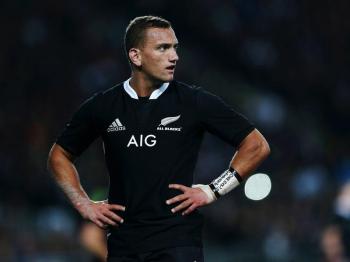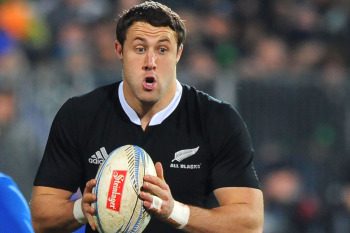
AUCKLAND, NZ – Alright, this is what The Rugby Championship needed. The greatest rivalry in rugby is about to hit us in the form of the All Blacks playing the Springboks – the heavyweight championship for global rugby supremacy. So much history, so much intensity, so much pride goes on the line when the team that has the best record against the All Blacks comes to town. NZ will be praying that the rain from last week stays away, but that may be wishful thinking. Aussie fans may be thinking the same thing but the Wallabies take on Los Pumas on the Gold Coast, so at least it will be warmer.

So far, we’ve seen a week of injuries, replacements and some serious talk about refereeing. On the last point, it’s gone so far as to have All Black coach Steve Hansen making the entirely far-too-sensible suggestion that referees and linesmen work together in crews, much like American Football. Of course, given the IRB’s pretty sedate approach to common sense, it’ll be about six years before anything like this actually gets put in place. So far in The Rugby Championship we’ve had one week of bad refereeing, one week of good and then the latest week being blighted by refereeing that can be described as nothing short of atrocious. So, by that rationale, this week should be excellent, right?
We’ll find out when the action kicks off in Wellington where the All Blacks host the Springboks in the most intense rivalry in world rugby. #NZLvRSA
Unfortunately, you can’t talk about the history of this fixture without mentioning apartheid. South Africa’s turbulent political and social history has overlapped onto the sporting field in both countries, with matches between the two sides being marred by protests in NZ and touring sides to South Africa restricted to white players only. South African racial attitudes first reared their ugly head in 1921 (hardly a time of racial tolerance anywhere in the world, but still), when a South African journalist telegrammed back to his newspaper expressing his disgust at the Springboks having to play against the NZ Maori side.
Things didn’t get any better after World War II when the new apartheid regime restricted the 1949 All Blacks to a whites-only team, forcing them to leave behind a group of their best players. The Springboks won the series 4-0, while at the same time back in NZ, another All Black side lost the Bledisloe Cup to the Wallabies. Australia probably couldn’t believe their luck over the foolish NZRU agreeing to such a ridiculous arrangement. Arguably the lowest on-field moment in All Black history was that 3rd of September 1949, when both All Blacks sides lost on to their respective opponents on the same day.

In 1960 another whites-only All Blacks side toured and again lost the series, however one event that year meant things would never be the same. The Sharpeville Massacre on March 21st showed the world the ugliness of the apartheid government and public opinion started to dramatically divide on whether the All Blacks should be playing there. Other sporting bodies started to turn their back on South Africa during the 1960’s; international cricket, then the Olympics. However, rugby stubbornly clung on to the mistaken belief that ‘politics and sport don’t mix‘.
The 1976 All Black tour to South Africa was probably the lowest off-field moment in All Black history. The South African government allowed Maori and Polynesian All Blacks to tour, however it was under the patronizing title of ‘honorary whites‘. The tour sparked a boycott by members of the African National Congress of the Montreal Olympics, which is the most shameful and embarrassing episode that New Zealand rugby has been involved in.
Unbelievably, the NZRU and government still thought sporting relations with South Africa were acceptable in 1981. The Springbok tour that year saw the largest level of civil disobedience ever seen in this country, with massive protests held. Police had to guard every game with barbed wire, two games were abandoned due to pitch invasions by protesters, and the final test will always be remembered for the presence of a light plane that constantly buzzed over Eden Park dropping flower bombs and flares on the pitch. Yes, that actually happened.
After that the government banned any further sporting contact with South Africa, but that didn’t stop an attempt by the NZRU to tour there in 1985. A High Court injunction stopped that tour but an unofficial rebel tour by a team known as ‘The Cavaliers’ went ahead in 1986 and played a series against the Springboks, which they lost. Notable among the players that turned down the offer to play for the Cavaliers were wing John Kirwan and halfback David Kirk. Kirk went on to become the first man to lift the William Webb Ellis Trophy, more commonly known as the World Cup a year later.
No further contact with the Springboks would be held until 1992, when apartheid had been banished forever. I’ll cover the more upbeat history between the All Blacks and Springboks next week.

Okay… After that history lesson, let’s look into the future: Saturday night the All Blacks have returned Aaron Cruden to first five for this clash, despite Beauden Barrett’s compelling case against Los Pumas. The other big changes comes in the forwards, where the rib injury suffered by Sam Whitelock means Jeremy Thrush gets a start at lock and Steven Luatua gets a run at blindside for Liam Messam.
Expect the All Blacks to keep playing an up-tempo game through the forwards like last weekend, where they dominated possession for large parts of the game. Their scrum was particularly impressive, doing a number on the Argentines including a tighthead. This will have the Springboks particularly worried, given their own scrum woes against the same opposition. Look for Julian Savea to again feature prominently on the wing in front of his home town crowd and Israel Dagg will look to add to a solid performance last week and make the most of his international reprieve. The full team is:
All Blacks: 15 Israel Dagg, 14 Ben Smith, 13 Conrad Smith, 12 Ma’a Nonu, 11 Julian Savea, 10 Aaron Cruden, 9 Aaron Smith, 8 Kieran Read, 7 Richie McCaw (c), 6 Steven Luatua, 5 Jeremy Thrush, 4 Brodie Retallick, 3 Owen Franks, 2 Dane Coles, 1 Wyatt Crockett.
Bench: 16 Keven Mealamu, 17 Joe Moody, 18 Ben Franks, 19 Patrick Tuipulotu, 20 Sam Cane, 21 TJ Perenara, 22 Beauden Barrett, 23 Cory Jane.
Beware the wounded Springbok, well so the saying goes. In reality a wounded Springbok would be a pretty easy meal, but something tells me these Boks will come out swinging come kick-off. They’ll definitely come out running at least, The Rugby Championship first five merry-go-round sees Handre Pollard get the nod in what has been officially claimed as an attempt to play an expansive game plan. However, rumors have been circulating that Morne Steyn has paid the price for crucially missing touch in the dying stages of last week’s loss to the Wallabies. Another big motivating factor for the Boks is to play for one of their greatest players. Last week it was winger Bryan Habana who notched up his 100th test, this week it’s captain Jean de Villiers. The inspirational second five has been a cornerstone of South African rugby for the better part of a decade and will looking to have a strong game on defense to contain the likes of Ma’a Nonu.
In the pack Eben Etzebeth will be a force all around the park but should be careful to keep his emotions in check, given that not even Bismarck du Plessis’s reputation couldn’t save him from getting sent off in the corresponding game last year. They could do a lot worse than giving good front foot ball to Pollard to unleash Cornal Hendricks and Willie le Roux out wide. If the Boks really have come to run, this could be classic. The full team is:
Springboks: 15 Willie le Roux, 14 Cornal Hendricks, 13 Jan Serfontein, 12 Jean de Villiers (c), 11 Bryan Habana, 10 Handré Pollard, 9 Ruan Pienaar, 8 Duane Vermeulen, 7 Marcell Coetzee, 6 Francois Louw, 5 Victor Matfield, 4 Eben Etzebeth, 3 Jannie du Plessis, 2 Adriaan Strauss, 1 Tendai Mtawarira.
Bench: 16 Bismarck du Plessis, 17 Trevor Nyakane, 18 Marcel van der Merwe, 19 Lood de Jager, 20 Warren Whiteley, 21 Francois Hougaard, 22 Pat Lambie, 23 Damian de Allende.
Prediction: If there’s one thing you can count on All Black/Springboks tests, it’s that you should forget all that has come before during the season and prepare for the most intense match you’re likely to see. All Blacks by 5.

Man to watch: Jeremy Thrush gets his test start on his home ground. Replacing Sam Whitelock and marking Victor Matfield might just be the toughest assignment in world rugby, so he’ll need to have a huge game to live up to expectations.
The other match is over on Australia’s Gold Coast (or the GC, as it is known in these parts) at CBus Stadium, where the Wallabies meet Los Pumas. #AUSvARG
Wallaby coach Ewen McKenzie has had the problem of not having any hookers available to him lately (ha ha), but Tatafu Polota-Nau has passed a fitness test and has been rushed back into the starting line up, which will be his 50th test. Other changes to the home team see Ben McCalman come in at number 8 while Peter Betham gets a run on the wing for the injured Adam Ashley-Cooper.
The Wallabies will be feeling pretty good after their comeback win last week against the Boks and will look to open it up again through Bernard Foley and Matt Toomua, who proved to be an effective pairing last week. However, they should be wary of Los Pumas scrum, which was disappointing last week against the All Blacks and will be looking to re-establish it’s dominance.
Meanwhile Los Pumas have made changes at lock, with Matias Alemanno to replace the suspended Tomas Lavinini. Wingers Juan Imhoff and Manuel Montero have both been promoted to the starting side. The Argentines have impressed more than a few this season but their maiden TRC win is still to be found. It’ll take a huge effort to get it away from home, but they can take a lot out of last week’s loss. The full teams are:
Wallabies: 15 Israel Folau, 14 Peter Betham, 13 Tevita Kuridrani, 12 Matt Toomua, 11 Rob Horne, 10 Bernard Foley, 9 Nick Phipps, 8 Ben McCalman, 7 Michael Hooper (captain), 6 Scott Fardy, 5 Rob Simmons, 4 Sam Carter, 3 Sekope Kepu, 2 Tatafu Polota-Nau, 1 James Slipper
Bench: 16 James Hanson, 17 Pek Cowan, 18 Ben Alexander, 19 James Horwill, 20 Scott Higginbotham, 21 Matt Hodgson, 22 Nic White, 23 Kurtley Beale
Los Pumas: Joaquin Tuculet, Juan Imhoff, Marcelo Bosch, Juan Martin Hernandez, Manuel Montero, Nicolas Sanchez, Martin Landajo, Leonardo Senatore, Juan Martin Fernandez Lobbe, Juan Manuel Leguizamon, Matias Alemanno, Mariano Galarza, Ramiro Herrera, Agustin Creevy (captain), Marcos Ayerza.
Bench: Matias Cortese, Bruno Postiglioni, Nahuel Tetaz Chaparro, Benjamin Macome, Rodrigo Baez, Tomas Cubelli, Jeronimo De la Fuente, Lucas Gonzalez Amorosino
Prediction: The Wallabies have their tails up and should be too hard to stop on a warm GC night. Wallabies by 16.
Man to watch: Tevita Kuridrani played his part last week going 80 minutes and having a crucial hand in the winning try. Hopefully the Wallabies can unleash him through the middle of the park.
There we go, ready to go again in the battle for Southern Hemisphere supremacy. One plea this week: refs, get it right…please?
That’s it for now. Feel free to comment below, please look for and “Like” our Facebook Rugby Wrap Up Page and follow us on Twitter@:RugbyWrapUp, Junoir Blaber, Nick Hall, James Harrington, Jamie Wall, Jaime Loyd, DJ Eberle, Cody Kuxmann, Karen Ritter, Jake Frechette and Declan Yeats, respectively.

